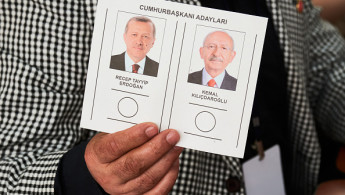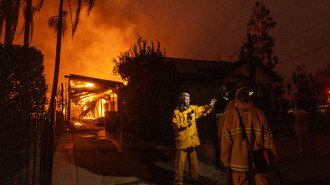Breadcrumb
Turkey rides nationalist wave in historic vote between Erdogan and Kilicdaroglu
Suffering a massive economic crisis and surrounded by countries at war, Turkey is witnessing a resurgence of nationalism that has impacted the fate of its biggest election of modern times.
Leading his rival, Kemal Kilicdaroglu, by nearly five points after the first round, President Recep Tayyip Erdogan enters Sunday's runoff as the firm favourite.
The Islamic-rooted leader's chances have been bolstered by the endorsement of Sinan Ogan, an ultra-nationalist who came out of seemingly nowhere to win 5.2 percent of the vote on May 14.
Smaller right-wing parties also picked up nearly a quarter of the parallel parliamentary polls.
Historians and analysts are struck by the symbolism of a patriotic wave washing over Turkey on the 100-year anniversary of its foundation as a post-Ottoman republic.
The modern state's founder, Mustafa Kemal Ataturk, made "Turkishness" into a national idea and unifying force that bridged the cultural and religious divisions of the old empire.
Now, surrounded by wars stretching from Syria to Ukraine, and living through its worst cost-of-living crisis since the 1990s, Turks are embracing nationalism again.
"Nationalism is a comfort, we feel good there," said French historian Etienne Copeaux, a specialist in Turkish nationalism.
"It's like an air constantly blowing over Turkey," he added, rejecting any contradiction between this surge and the political Islam advocated by Erdogan since his days as Istanbul mayor in the 1990s.
"The allegedly secular Turkey is a myth," Copeaux said, pointing to a maxim adopted by the MHP, an ultra-nationalist party that has joined forces with Erdogan's Islamic-rooted AKP.
"One is not Turkish if one is not Muslim," the MHP affirm.
Chipping away at Turkey's secular foundations by allowing women to stay veiled in public and converting ancient churches into mosques, Erdogan has been careful to "never completely reject" Ataturk's legacy, Copeaux said.
Others, like Can Dundar, are more sceptical.
Living in self-imposed exile because of a highly controversial "terrorism" conviction in Turkey, the former Cumhuriyet newspaper editor laments voters' decision to pick stability over change.
"Instead of peace and freedom, they chose security," Dundar said.
Dundar noted that this tendency is not specific to Turkey in times of crisis.
But it has been especially pronounced in this vote, where the MHP outperformed expectations and the opposition alliance includes a nationalist party headed by former MHP members.
Menderes Cinar, a professor of political science at Baskent University in Ankara, said Turkey has been witnessing a "parallel breakthrough of nationalism and Islam since the 1990s".
Kilicdaroglu, whose socially democratic CHP party was founded by Ataturk, has responded by ditching his embracing language in favour of fist-thumping speeches that strike ardently nationalist tones.
"We will not turn Turkey into a depot for migrants," he said in a visit to the quake-ravaged Syrian border city of Antakya, pledging to expel millions of migrants within two years.
Kilicdaroglu has also struck an alliance with Umit Ozdag, a fringe, far-right figure who has campaigned hard against migrants and wants to become the interior minister in the new government.
This has triggered the unease of the pro-Kurdish HDP party, which backed Kilicdaroglu in the first round but briefly considered boycotting the second round because of his rightward turn.
Kilicdaroglu has managed to keep the HDP on board.
But its support left Kilicdaroglu only more exposed to charges of colluding with "terrorists" from Erdogan, who views the HDP as the political wing of banned Kurdish militants.
Cornered and trying to fight back, Kilicdaroglu's new nationalist stance is "logical", Cinar said.
"But it also risks making him lose all credibility," the analyst added.







![Anthony Blinken speech [Getty] Anthony Blinken speech [Getty]](/sites/default/files/styles/image_684x385/public/media/images/6263436E-8ACD-4D3C-9055-25A7BE79DD5A.jpg?h=d1cb525d&itok=fLHmHCRG)
 Follow the Middle East's top stories in English at The New Arab on Google News
Follow the Middle East's top stories in English at The New Arab on Google News

![Maj Gen Ali Nour al-Din al-Naasan appointed new Syria's army chief [Twitter]](/sites/default/files/styles/image_330x185/public/2025-01/new%20Syrian%20nilitary%20chief.jpg?h=19839aca&itok=6tb5qhNB)